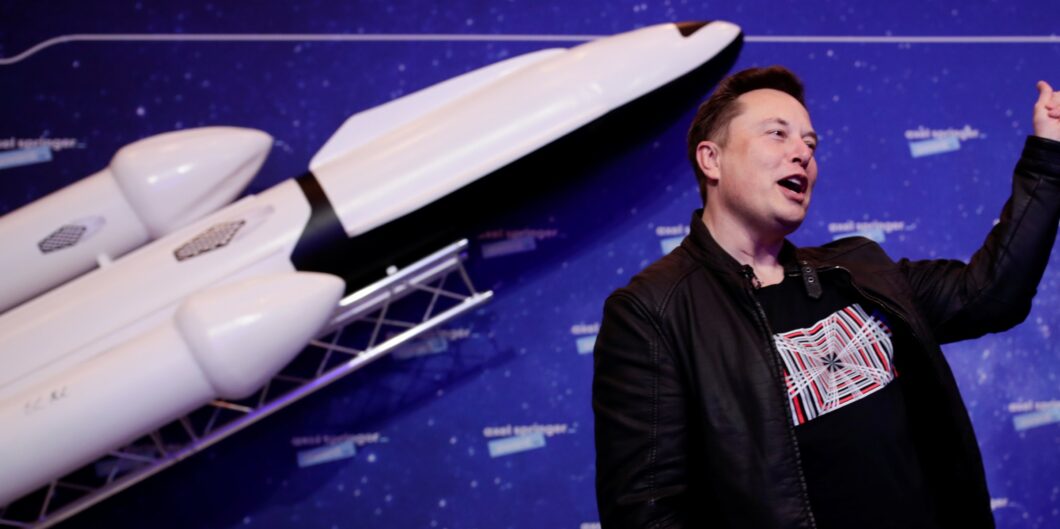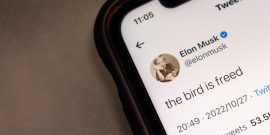Public Enemy Number One?
Elon Musk’s brilliant career was made possible by three things: his relentless genius, America’s openness to foreign-born talents, and the dynamism of capitalism. Walter Isaacson’s fine new biography, Elon Musk, highlights the first factor but is less strong on the influence of the second two, even as he provides ample information that demonstrates their importance. And despite his success and immense wealth, Musk remains at risk of ultimate failure—not only because of the occasional hubris and instability of his genius, but because of the decline of American respect for the freedoms that make robust capitalism possible.
Musk’s early circumstances would not have seemed propitious for the greatest businessman of this century. He was born in South Africa, first an apartheid state and then a corrupt nation that has remained a backwater. He was very bright, but he was bullied and belittled at home and at school (his father even called him “worthless”). His parents soon divorced, and he grew up relatively poor in a single-parent household.
But his fortunes began to change when he migrated—first to Canada and then to the United States, eventually attending the University of Pennsylvania. America, as it had for many immigrants before, provided opportunities for the single-minded striver. And Musk, as portrayed by Isaacson, works as hard as any man alive, regularly sleeping under his desk at the office and pulling all-nighters into his sixth decade. His favorite word of praise for colleagues is that they are “hardcore,” and the presence of so many other hardcore workers in America’s entrepreneurial culture has been a key to his success. No doubt all his many successful companies are the shadow of one man, but they depend day-to-day on the ambitions of hundreds of others.
Indeed, Musk’s first big score, PayPal, was a collaborative one with many other soon-to-be-famous Silicon Valley titans, including Peter Thiel and Reid Hoffman. Musk was briefly CEO, but his partners fired him in large part because of his effort to rebrand PayPal as “X.com.” (Thus, his recent change of Twitter to X is an idée fixe he has long held.) But, like many before him, he found there were second acts in American life. Immediately, he risked almost his entire PayPal payout on two companies with grander visions: SpaceX and Tesla. Past American immigrants had pushed into the physical frontier. He pushed out into the technological frontier with reusable rockets and electric cars, the latter promising ever-better autopilots. Indeed, Musk’s ambitions ultimately are not even primarily about making money. He sees his work with Telsa as battling climate change, Space X as leading to interplanetary travel, and his various artificial intelligence ventures as advancing a friendly AI that will not threaten humanity. As Isaacson notes, he has a cosmic self-image with a destiny to safeguard civilization.
The key to Musk’s business achievements has been his implacable efforts at cutting the costs of his products’ components. His motto is that the only constraints on such efforts are physical laws, not the traditions of industry or even the regulations of government. “Step one should be to question the requirements,” he says. “Make them less wrong and dumb because all requirements are somewhat wrong and dumb. And then delete, delete, delete.”
To lower costs, he moves the production of components in-house so that he can oversee the process. Such comprehensive vertical integration is not the norm in most manufacturing businesses, because buying components on the market benefits from competition. But vertical integration in this case takes advantage of Musk’s ferocious drive. Moreover, as Nobel Prize winner Ronald Coase has shown, integration can be profitable because such encompassing companies, when well-managed, can reduce the transaction costs of search, monitoring, and coordination. Musk, for instance, has made sure that designers and engineers in his firms always work well as teams so that fashion and function can be optimized together.
Isaacson is particularly good at providing vivid descriptions of the many risks Musk took in building his empire. At times, SpaceX was at risk of going under if he didn’t get a successful launch. At other times, he revved up production at Tesla just in time to keep the company solvent. Musk’s life seems scripted for an Indiana Jones movie: he gets out of one impossible jam only to land in another. Working for him is not for the faint of heart, particularly because his autism inhibits emotional bonds with colleagues. But one of the greatest advantages of markets is that they take human beings, with all their flaws and eccentricities, and deploy the enormous talents they have for tremendous social benefits.
Modern America is more hostile to the very rich than it once was, particularly when they are as independent and unconventional as Musk is.
Musk provides a walking advertisement for the greatness of the one-thousandth of the one percent. As rich as he has become, he has provided far more benefits to others—to the shareholders who have become rich with him, to the employees who take tremendous pride in their contributions and sometimes go on to found their own companies based on what they have learned, and, of course, to his customers. The general public benefits as well. Insofar as global warming is a problem, he has created the car company that is most likely to successfully reduce auto emissions. SpaceX has saved the taxpayers hundreds of millions of dollars by sending up NASA’s payloads at a fraction of the cost of the government’s old command-and-control operations, to say nothing of the “cost plus” contracts of legacy aerospace companies like Boeing and Lockheed. In this latter enterprise, Isaacson recounts how Musk is spurred to ever greater heights by his competition with another centibillionaire, Jeff Bezos, whose Blue Origins space company has similar ambitions but lacks as much single-minded direction from the top. As Isaacson notes, it is an example of how competition between the wealthy “can push a field forward.”
Isaacson sees Musk as his own greatest enemy—a hero with innate tragic flaws, both his lack of empathy and his revelry in excessive risk. And these do remain potential problems. But Musk’s risk-taking has paid off, and his lack of empathy may be necessary to avoid the sentimentality that leads some leaders to indulge subordinates who slack off. In my view, by far the greatest threat to Musk is the political world. Modern America is more hostile to the very rich than it once was, particularly when they are as independent and unconventional as Musk is. Some expressions of hostility are almost comical. President Joe Biden lauded GM and Ford for their movement toward making climate-friendly electric vehicles. He did not at first even mention Tesla, which had produced more electric vehicles than those long-term automakers. But Tesla is non-union, and Biden styles himself the union President.
When Time magazine named Musk “Person of the Year” in 2021, Senator Elizabeth Warren responded with a caustic tweet: “Let’s change the tax code so the Person of the Year will actually pay taxes and stop freeloading off of everyone else.” Musk who had sold over ten billion dollars in stock certainly got the better of the exchange: “If you opened your eyes for 2 seconds, you would realize I will pay more taxes than any American in history this year. Don’t spend it all at once. oh wait you did already.” But power, not repartee, determines citizens’ fates in politics, and the administration is currently stocked with Warren acolytes, one of whom, Lina Khan, is now going after Musk for his management of Twitter.
Isaacson spends a great deal of his book describing Musk’s recent purchase of Twitter. His conclusion is that Musk is unsuited to owning that company because its problems do not concern engineering, over which he is wizard, but messy human emotions, which he struggles to understand. This analysis sells Musk short. His motivation for buying Twitter was not to improve its engineering but to increase its epistemic openness—an enterprise at the heart of humanism. As with most of his other companies, he saw running Twitter as benefiting mankind, because open debate and disagreement would help human flourishing, not less than clean energy and interplanetary discovery. And Musk was right to believe that Twitter was performing not as well as it could at its essential task—too willing to take down information at the government’s bidding. It was hardly a surprise then that one of his first acts was to release files from Twitter that showed that an overwhelmingly left-liberal staff (98 percent of their campaign contributions went to Democrats) frequently suppressed speech by conservatives and even by respected scientists who challenged a scientific consensus that was friendly to left-wing policies.
Musk’s ownership of Twitter, now renamed X, increases his political peril. The President is able simply to ignore the achievements of a car company, but not social media—it is too integral to what politicians do. And indeed, in an interview last week, Biden attacked Musk’s stewardship of Twitter/X, agreeing with a reporter that Musk has lowered the “guardrails on misinformation.” Actually, Musk has largely replaced unilateral decisions to police information with “community notes” that offer a decentralized way for users to add context to misleading information. What he refuses to do is suppress the kind of stories that the old Twitter did—like those about Hunter Biden in the middle of the presidential campaign.
More generally, Musk is now a target because the left benefits from decreasing the openness of social media thanks to its dominance of more traditional sources of information from academia to the mainstream media. In the same interview, Biden cryptically warned about Musk’s possible relationships with foreign governments without providing any evidence of what he meant. The presidential megaphone can provide a particular narrative of events, cripple effective mechanisms for disseminating alternate views, and possibly even signal his preferences to zealous executive branch regulators: “Will no one rid me of this turbulent businessman?”
I have never been a fan of Ayn Rand’s novels and their simplistic portraits of heroic entrepreneurs battling politicians and bureaucrats who want to destroy them and rob us of the benefits of capitalism. But one message from Musk’s life is that Rand’s work contains a kernel of truth relevant to our age.



